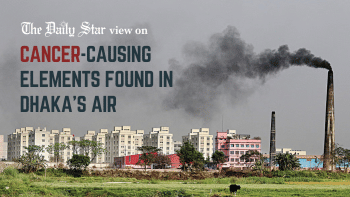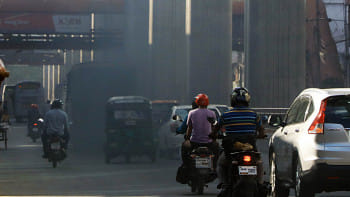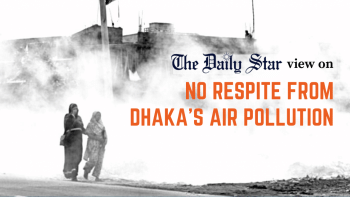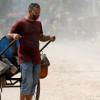Dhaka's toxic air: An invisible killer on the loose

Imagine an invisible serial killer lurking around the corner, waiting to suck the life out of you with its all-consuming, toxic embrace. This is what Dhaka's air has become. Every day, millions of people breathe in and breathe out Dhaka's toxic air, full of pollutants and carcinogenic heavy metals and chemical elements like arsenic, lead, cobalt and cadmium. According to a report published in this daily, the concentrations of these elements are almost double the permissible limits set by the World Health Organization (WHO). The report also added that among the 27 locations that have been studied, Dhaka is the only one where the combined carcinogenic risk "exceeds the benchmark for both adults and children."
These are alarming facts without a doubt, but having breathed this toxic air over the years, are we surprised? I certainly am not.
Commenting on the overall deteriorating air quality, the environment minister told this daily recently, "We all know how grave and critical the air quality situation is and we did not get here in one day. There can be no overnight fixes but now that we have identified the sources of the pollution, have acknowledged the problem, and have been honest and upfront about it, I think we are now headed in the right direction."
If anything, the minister is right. We have not come to this overnight and there is no instant solution to it. What is not clear to me is where the "right direction" is, and who is going to guide us there.
Some of the key reasons why Dhaka's air is so toxic is because we allow unfit vehicles to ply the roads. We have enabled an entire e-waste recycling industry to flourish without proper environmental impact assessment and without developing an e-waste management system. Under the very noses of the authorities, coal-fired brick kilns are operating in full swing in and around the capital, and trees are being felled by the authorities who should have been guarding them in the first place.
A 2021 study by the Centre for Atmospheric Pollution Study (CAPS) revealed that 15 percent of the air pollution in Dhaka is caused by unfit vehicles. The study also found that unplanned and uncontrolled construction and road work lead to about 30 percent air pollution in the capital. Pollution caused by industries and brick kilns stands around 29 percent, irresponsible waste incineration causes seven percent, transboundary air pollution around 10 percent, and nine percent from cooking stoves. Many of these parameters impact the level of carcinogens in the air.
But what is the gain in reflecting on our past failures? It is time we looked forward and identified areas of improvement. Instead of diverting our focus from real issues at home to transboundary air pollution—over which we have little control—we should look at what we can do to gradually improve the situation, and there are at least four major areas that we should work on.
Unfit vehicles come first. Of the 60 lakh registered vehicles in the country, about 6.17 lakh run with no or expired fitness certificates, according to the Bangladesh Road Transport Authority (BRTA). In July 2019, the High Court banned unfit vehicles from plying the roads. The same year in October, the High Court banned fuel sale to unfit vehicles. In February 2020, it directed the authorities to form a nationwide task force to take unfit vehicles off the roads. Nothing seems to have come out of these directives. In addition to turbocharging air pollution, unfit vehicles are a major cause behind road accidents, resulting in the killing of thousands. On Wednesday, Road Transport and Bridges Minister Obaidul Quader said unfit vehicles would be banned in Dhaka, among other measures to minimise road accidents. This will have a positive impact on air quality, if implemented. It has become imperative for us to prioritise national interest above vested interests and take stringent measures to clamp down on unfit vehicles. Corruption in the system, especially the BRTA, must be completely scotched.
A 2021 study by the Centre for Atmospheric Pollution Study (CAPS) revealed that 15 percent of the air pollution in Dhaka is caused by unfit vehicles. The study also found that unplanned and uncontrolled construction and road work lead to about 30 percent air pollution in the capital. Pollution caused by industries and brick kilns stands around 29 percent, irresponsible waste incineration causes seven percent, transboundary air pollution around 10 percent, and nine percent from cooking stoves. Many of these parameters impact the level of carcinogens in the air.
Secondly, we should address our e-waste mismanagement. Bangladesh produces about 30 lakh tonnes of e-waste every year. Most of these contain carcinogenic elements such as lead, mercury and cadmium. Still, often this waste is burned, sometimes to get rid of them, and sometimes to extract precious metals like gold and silver from the circuit boards. Burning this waste releases harmful toxins in the air, posing a significant public health hazard. Being an informal sector, there is little control over its operations. Although the e-waste management rules were published in 2021, the government has not been able to implement it due to resistance from various quarters and an obvious lack of political will. It must push the implementation of the e-waste management rules, which have set clear limits on the usage of heavy metals. At the same time, a conducive ecosystem and required infrastructures should be ensured so that those involved in e-waste recycling can work in conditions that are not hazardous for them and the environment.
Illegal brick kilns come next. In 12 towns surrounding Dhaka, there are around 1,246 illegal brick kilns. In Dhaka and five of its adjacent districts, there are about 559 illegal brick kilns. These need to be shut down permanently and immediately. In the recent past, 737 brick kilns have been shut down. The current environment minister has taken legal action against 458 brick kilns, 209 of which have been shut down across the country. But then there remain the others that need to be taken care of as well and soon.
Finally, we should prevent felling of trees and focus on organised urbanisation of Dhaka. Trees not only give us fresh air to breathe, but also remove pollutants from air. In the name of development and beautification, the city corporations and other authorities, including the Bangladesh Inland Water Transport Authority (BIWTA), have felled hundreds of trees across the capital, which has taken its toll on air quality, leading to Dhaka's toxic air. The BIWTA has promised to plant 1,620 trees, and the Dhaka North City Corporation (DNCC) and Dhaka North City Corporation (DSCC) are taking initiatives to plant new trees, but these are only piecemeal measures. The sustainable approach would be organised and green urbanisation of the capital, which should be the focus of all relevant bodies.
As citizens, we can do our part to improve air quality by making responsible choices: from not using unfit vehicles, to responsible disposal of e-waste, and planting more trees in our surroundings. However, at the national level, the onus is on the government to chalk out and implement watertight measures to curb air pollution. The question is, do they have the political will?
Tasneem Tayeb is a columnist for The Daily Star. Her X handle is @tasneem_tayeb
Views expressed in this article are the author's own.
Follow The Daily Star Opinion on Facebook for the latest opinions, commentaries and analyses by experts and professionals. To contribute your article or letter to The Daily Star Opinion, see our guidelines for submission.

 For all latest news, follow The Daily Star's Google News channel.
For all latest news, follow The Daily Star's Google News channel. 











Comments